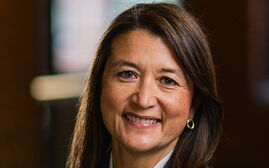Leigh Saufley, new law school dean, talks about move from courtrooms to (empty) classrooms
 Photo / Tim Greenway
Leigh Saufley, former chief justice of the Maine Supreme Judicial Court, is settling into her new office at the University of Maine School of Law. She looks forward to the day she can meet students in person.
Photo / Tim Greenway
Leigh Saufley, former chief justice of the Maine Supreme Judicial Court, is settling into her new office at the University of Maine School of Law. She looks forward to the day she can meet students in person.
On April 15, Leigh Saufley took the reins as dean of the University of Maine School of Law after serving as chief justice of the Maine Supreme Judicial Court for close to two decades. In her first week on the job, she spoke to Mainebiz about what it’s like working in an empty building and what she looks forward to most.
Mainebiz: How strange is it to start without any students in the building?
Leigh Saufley: What drew me to the law school was the students, the incredible faculty and staff. To have to start this job in a building where no one else is able to be present, it’s almost surreal.
MB: With distance learning going so well, are you thinking about expanding online options?
LS: Absolutely! When the world gets back to the new normal, it will not be the same again. We’ve now seen how well we can do distance learning. It means that we will be able to engage students who can’t get to whatever classroom the course is being taught in. We already know that we want to upgrade the equipment so we can do this really well, so we can reach out across the counties to students who might not otherwise have this opportunity. Ultimately, I anticipate that we will reach out across to [other] states to engage students, and to faculty who can beam in and present classes in ways we’ve never done before.
MB: These are tough times for all public law schools. What’s your biggest challenge?
LS: This is a tough time for all institutions that are driven by our national and our state-based economy. I think the big challenge for the University [of Maine] System and for the law school is being completely transparent about what the needs are, what resources really are critical, how we can rebuild from here and what we can all do to fire the economy back up when we return to normal.
MB: How do you then raise money for an educational institution at a time when the economy may go into a protracted downturn?
LS: We are going to assume that the economy will right itself fairly quickly. One of the things that has been really gratifying as I have moved into this job is how many people have reached out to say, “I want to support the law school, I want to support the new [University of Maine] Graduate and Professional Center, how can I be of support?” That’s been great to hear, and we will be working with them for months and years to come.
MB: What do you see as the most important part of your job?
LS: The most important part of any dean’s job is to make sure that the students are thriving, and that when they leave the law school or whatever school they have come from, they can be successful. So the focus is always on giving them the tools they need to be successful in life. And if they are successful, then the rest of us will be successful. That’s really what it’s all about.
MB: Any plans to continue some of the programs that have been successful, like the Rural Lawyer Project?
LS: Absolutely! In fact, the need for more lawyers in the rural and semi-rural areas of Maine is enormous, so the Rural Lawyer Project is near and dear to my heart, as is the PLUS [PreLaw Undergraduate Scholars] Program. At the same time, the law school has also created this new privacy certificate, and we all know how important these issues are.
MB: Might you add other professional programs as well?
LS: I anticipate there will be more programs that focus on innovation and incubation, and much more focus on interdisciplinary work.
MB: Finally, anything you can do in this role to open the door for more women in Maine to become judges?
LS: In the [Maine Law] class that I graduated in, the class of 1980, five of us became judges, and all five of us are women. The opportunities for women in every aspect of the law these days are expanding all the time, and I certainly hope that I will be able to be a mentor and continue to encourage that.














0 Comments